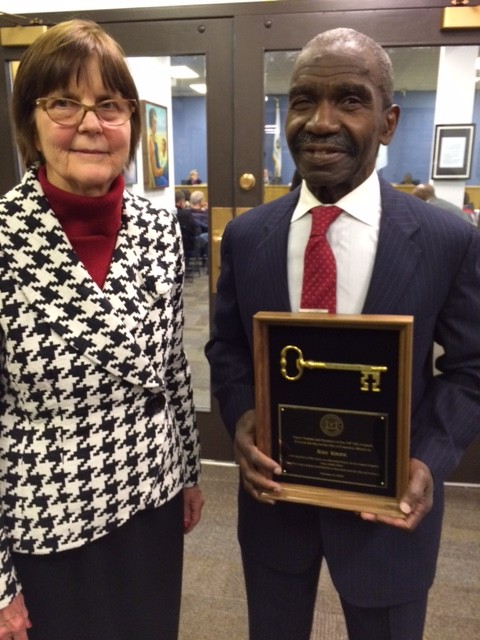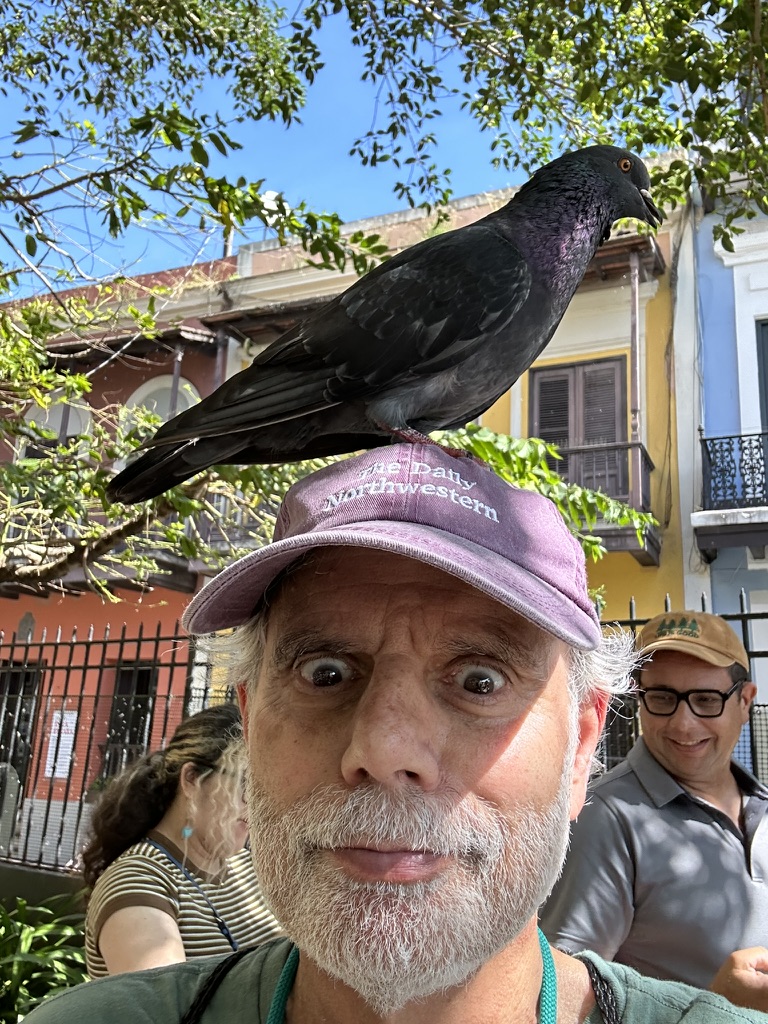Evanston RoundTable, Feb. 11, 2016
To a standing ovation from City Council members and dozens of people in the audience, former Negro Leagues baseball player Ray Knox was presented with the honorary key to the City by Mayor Elizabeth Tisdahl at the Feb. 8 City Council meeting. Mr. Knox, who lives in south Evanston, was acclaimed for “his long-lasting contribution to baseball and the City of Evanston,” according to the plaque awarded to him.

“It’s an honor to have you in our community,” Mayor Tisdahl added.
Mr. Knox played from 1949 to 1952 with the Chicago American Giants and New Orleans Eagles. He is believed to be one of just 58 Negro Leagues players still alive. He was only 20 years old at the time he left baseball to marry his sweetheart, Sarah Belle, and start a family.
The second-to-last of eight children, Mr. Knox was born in McComb, Miss., in 1932, and came to Wheaton, Ill., with his family at the age of 7. “We wanted to get out of the South,” he says of the move.
“I could play every position but I loved catching,” he recalls, reflecting on his career. “I had a strong arm and nobody could steal on me. I used to instruct our second baseman to tell the runners I threw out: ‘Read the Good Book: it says, thou shalt not steal.’”
The Negro Leagues were established in 1920 to provide black athletes a place to play at a time when Major League teams were not integrated. After Jackie Robinson joined the Brooklyn Dodgers in 1947, and other leading African American players followed him to the Majors, the Negro Leagues gradually declined in popularity and were disbanded in the early 1960s.
Mr. Knox was scouted while playing semi-pro ball in Aurora, and started with the Chicago American Giants in 1949 at the age of 17, one of the youngest Negro Leagues players ever signed. The Giants played in the original Comiskey Park when the White Sox were out of town, and could draw sizable crowds, especially on Sundays.
He was paid $140 to $175 a month during his career, which was “good money,” he says, especially since the team took care of food and board when they played away games.
Nevertheless, traveling around the country had its perils. “When we were in the South, we used to have to send one of the lighter-skinned players, who could pass for white, into a restaurant to order food for the rest of us.” And players had to live with black families in towns where the hotels wouldn’t allow blacks to stay.
“But it didn’t make any difference to me,” he says of the Jim Crow discrimination. “I loved to play baseball, that’s all I cared about.”
In 1951 he left Chicago to play two seasons for the Eagles in New Orleans, where he had family. While in Louisiana he played briefly for the Hardwood baseball team in Baton Rouge. It was when he returned to New Orleans to play against the Eagles that he got his nickname “Boo Boy.” “The manager encouraged the crowd to ‘boo that boy’ for leaving New Orleans,” he laughs.
Mr. Knox’s parents insisted he continue his schooling when he played away from home, so from time to time the Eagles dropped him off at local high schools for a few weeks or a month at a time. One of his older brothers would travel with him as a chaperone, making sure he stayed up with his classwork.
What was it like to play in the Negro Leagues? “It was something else,” he still enthuses. He played against or knew such stars as Ernie Banks, Minnie Minoso and Hank Aaron, and once saw the legendary Satchel Paige pitch in Chicago at a Negro Leagues exhibition game. “He was in his 60s but I could hear that ball popping in the catcher’s mitt like he was still in his 20s.”
After leaving baseball Mr. Knox and his young family moved back to the Chicago area to manage a dry cleaner in Bensenville. His wife died in 1963, and several years later he moved to Evanston to run Ken’s Cleaners on Dempster and Glenwood. He has five children, three grandchildren and four great-grandchildren.
In recent years he has begun traveling around the country working baseball memorabilia and card shows, where he signs autographs and talks with fans about the storied Negro Leagues. He always tells them: “Yes sir, we had a good time.”





+ There are no comments
Add yours